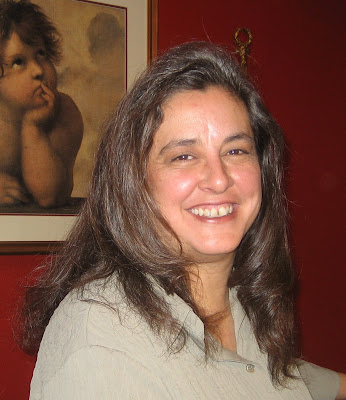

Sheryl Luna was born and raised in El Paso, Texas. Her collection of poetry Pity the Drowned Horses won the first Andres Montoya Poetry Prize sponsored by the Institute of Latino Studies and the creative writing department of the University of Notre Dame. The judge was Robert Vasquez. The collection was profiled in "18 Debut Poets who Made their Mark in 2005" by Poets and Writers Magazine. A graduate of Texas Tech University, she earned a doctorate in contemporary literature from the University of North Texas and a M.F.A. from the University of Texas at El Paso. She also holds a M.A. in English from Texas Woman's University. Her work has appeared in Feminist Studies, Notre Dame Review, Georgia Review, American Literary Review, and many other nationally acclaimed journals. She's received scholarships from the Provincetown Fine Arts Work Center and the Napa Valley Writer's Conference. Pity the Drowned Horses was a finalist for the National Poetry Series and the 2006 Colorado Book awards. Her second manuscript of poems, titled 7, was recently runner-up for the Ernest Sandeen Poetry Prize sponsored by University of Notre Dame. She currently teaches at the University of Colorado in Boulder, Colorado.
Bones
Once, as a girl, she saw a woman shrink
inside herself, gray-headed and dwarf-sized,
as if her small spine collapsed. Age
and collapse were something unreal, like war
and loss. That image of an old woman sitting
in a café booth, folding in on herself, was forgotten
until her own bones thinned and hollowed,
music-less, un-fluted, empty.
She says she takes shark cartilage before she sleeps,
a tablet or two to secure flexibility and forgets
that pain is living and living is pain.
And time moves like a slow rusty train
through the desert of weeds, and the low-riders
bounce like teenagers young and forgiving
in her night’s dream. She was sleek in a red dress
with red pumps, the boys with slick hair, tight jeans.
She tells me about 100-pound canisters of lard
and beans, how she could dance despite her fifth
child, despite being beaten and left
in the desert for days, how she saw an angel
or saint glimmer blonde above her, how she rose
and walked into the red horizon despite
her husband’s sin.
I’m thinking how the women
in my family move with a sway, with a hip
ache, and how they each have a disk
slip. The sky seems sullen, gray, and few birds
whisk. It’s how the muse is lost
in an endless stream of commercials, how people
forget to speak to one another as our ending skulks
arthritically into our bones, and the dust
of a thousand years blows across the plain,
and the last few hares sprint across a bloodied
highway. Here in the desert southwest, loss
is living and it comes with chapped lips,
long bumpy bus rides and the smog of some man’s
factory trap. And there are women everywhere
who have half-lost their souls
in sewing needles and vacuum- cleaner parts.
In maquiladoras there grows a slow poem,
a poem that may only live a moment sharply
in an old woman’s soul, like a sudden broken hip.
And yet, each October, this old woman rises
like the blue sky, rises like the fat turkey vultures
that make death something beautiful, something
towards flight, something that circles in a group
and knows it is best not to approach death alone.
Each October she dances, the mariachis yelp
and holler her back to that strange, flexible youth,
back to smoky rancheras and cumbias, songs
rolling in the shadows along the bare Mexican hills.
She tells me, “It’s in the music, where I’ll always
live.” And somehow, I see her jaw relax,
her eyes squint to a slow blindness
as if she can see something I can’t.
And I remember that it is good to be born of dust,
born amid cardboard shanties of sweet gloom.
I remember that the bare cemetery stones
in El Paso and Juarez hold the music, and each spring
when the winds carry the dust of loss there is a howl,
a surge of something unbelievable, like death,
like the collapse of language, like the frail bones
of Mexican grandmothers singing.
Ambition
Danny Lopez was so dark that some thought he was black.
His eyes were wide and wild.
When he ran, his short frame’s stride heated the streets.
Sweat trickled down his bony face, and his throat
lumped with desire, the race, the win.
We used to sit on the hood of my parents’ car,
gaze at the stars. He would win state,
dash through the flagged shoot in Austin,
get a scholarship to Auburn, escape the tumbleweeds,
the dirt floors of his pink adobe home, his father’s rage.
We were runners.
Our thin bodies warmed with sweat, and the moon round
with dreams of release. We lived a mile from the border;
the Tigua Indian drums could be heard in the cool evenings.
Our rhythmic hopes pounded dusty roads, and cholos
with slicked hair, low-riders, were only a mirage.
We drove across the border, heavy voices, drunk
with dreams, tequila, and hollow fears. We ran
trans-mountain road, shadows cast cold shivers
down our backs in the hundred-degree sun.
Danny ran twenty miles, finished, arms raised
with manic exultation.
The grassy course felt different beneath his spikes,
and the gun’s smoke forgotten in the rampage of runners,
his gold cross pounding his chest to triumph, his legs
heedless to pain, his guts burning.
Neither of us return to the cement underpasses,
graffiti, and dry grass, though I know
the drums still beat when we look at the stars,
and our eyes flicker with ambition.
Brown children in tattered shorts still beg for pesos,
steal pomegranates and melons.
Young men with sweaty chests and muddy pants
ask my mother for work, food,
passage to that distant win
somewhere on the other side of Texas.
Today the green trees are wet with rain,
and I am too lazy to run. The desire to run my fingers
down an abdomen tight with ambition, is shaky, starved.
It’s been too long since I’ve crossed that border,
drunk tequila, screamed victorious
at the mountain. The stars seem small tonight,
they don’t burst over the sky like they did back then.
These poems, these books don’t ravish me
the way Danny could, the way the race could.
His accented English, broken on the wind, and his run,
his lean darkness, drove exhaustion to consummation.
The wind seems too humid in this preferred place,
and when I hear throaty Spanish spoken in the lushness,
I long for the grimy heat,
the Rio Grande’s shallow passage,
the blue desert, and the slick legs of runners
along the smoggy highway.
The Cordova Bridge
I’m not writing delicate silver birds or some Southwest
aubade. I am rough in a pebbled and stickered dead sea.
And here, crazy-sad among the flowerless places
I sweat my way through the dirge of horns and radio
blues. Smog- filled air. Sweaty dark-dirty children hang
on my car. Their paper cups hold out a coinless surrender.
El Pasoan’s call them scam-gangs. Bumper to bumper
as a rainbow smears the sky, window-washers beg for dimes.
The streets narrow in Juarez. Gaudy green hand-painted
school buses block signs. The poor wait. A bright scholar
described las ciudades hermanas as unmoving. Blue hills,
the river’s banks deceiving us to see one-sided, blind. Juarez,
me later driving in circles, cursing the mad stops, the move-over
hurriedness. El Paso’s streets are wide, people erect chain-
link fences, bars over windows. They love their small plots
of land, their jalopy cars. A poet once sang a maid’s daily
dread over Cordova. I think I see her sweating away.
I once drew a breath of lush serenity, words danced
as small breaths, gilded beads. But you see, I was cursed
in this dust, crystallized among charcoal frowns and smiles.
At times, anger is an unnamed cry. Must one sing lichen,
lagoons, a glint of sky, creamy white breasts? Here, men
and women living bare dance among crumbling things. A man
without a leg has hopped that bridge for thirty years eyeing
shiny red Firebirds. What was a bird of red-fire to him?
Do we all rise phoenix-like from our tumbleweeds? Rain-
wash twirls about brown knees, rolled jeans, bare feet.
Popsicle-sellers close tiny carts, cigarette boys cover
damp cartons. And I am dry as an American can be.
- ISBN-10: 0268033749
- ISBN-13: 978-0268033743
Lisa Alvarado
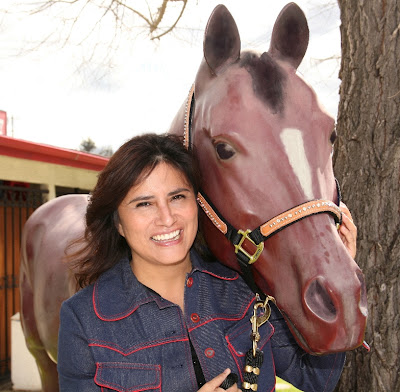

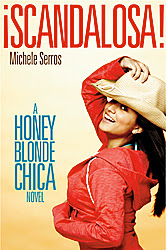
Michele Serros and Scandalosa
Named by Newsweek as "One of the Top Young Women to Watch for in the New Century" and by Tu Ciudad magazine as one of Los Angeles’ “Hip, Hot and Now” artists, Michele Serros is the author of Chicana Falsa and other stories of death, identity and Oxnard, How to be a Chicana Role Model, Honey Blonde Chica and her newest young adult novel, Scandalosa! In addition to being an award-winning poet, Serros has been a featured contributor for the Los Angeles Times' children's fiction section and a commentator for National Public Radio (Morning Edition, Weekend All Things Considered, Anthem, Along for the Ride, Latino USA). She has read her poems to stadium crowds of 25,000+ for Lollapalooza, recorded Selected Stories from Chicana Falsa for Mercury Records and was selected by the Poetry Society of America to have her poetry placed on MTA buses throughout Los Angeles County.
While still a student at Santa Monica City College, Michele’s first book of poetry and short stories, Chicana Falsa, was published. When the original publisher of Chicana Falsa went out of business, Michele continued to sell copies from her garage until Riverhead Books reissued Chicana Falsa and as well as a collection of short stories, How to be a Chicana Role Model. The latter instantly placed 5th on the Los Angeles Times bestseller list.
In 2002, Michele wrote for the ABC television sitcom, The George Lopez Show. "An opportunity," she says, "that hopefully with my contribution opens the door for a wider representation of Latinos in the mass media."
Serros’ work is required reading in U.S. high schools and universities and garners a diverse fan base ranging from Flea from the Red Hot Chili Peppers ("Michele is the great Californian writer who makes me proud of my state. When I read her books I cry and laugh.") to author Sandra Cisneros ("Michele Serros is the young, sassy writer whose brilliant weapon is her humor.”) The New York Public Library recommends Honey Blonde Chica as a “Book for the Teen Age 2007. Originally from Oxnard, California, Michele is currently working on a new novel, An Unmarried Mexican.
1. Scandalosa is a sequel to Honey Blonde Chica, with Evie a little bit further down the road of adolescence. Without giving too much away, what's going on with Evie?
In Scandalosa, Evie is now two months older than she was in HBC. She has also entered a new semester of school. In teenage years, such changes are paramount! She is excited to celebrate her Sweet Sixteen era and envisions her party to be similar to MTV's Sweet Sixteen but with all the traditional trappings (and birthday checks) of a quinceañera. BUT she is facing an obstacle. Will this obstacle interfere with her party... the pachanga of the school year? You'll have to read to find out!
2. You avoid a romantic portrayal of teens, yet Honey Blonde Chica isn't about the gang girl stereotype offered up as the YA Chicano/a experience. Can you also talk about the decision to write YA and it's significance to you, and your choice of
characters?
YA books saved me as a preteen. I grew up reading Judy Blume, Beverly Clearie, S. E. Hinton, and Louise Fitzhough. My first attempt at YA is an unpublished manuscript under my bed back home in NYC. It's titled Notes from a Medium Brown Girl. My agent has deemed it "took dark" and suggests that maybe I should focus on other projects but I haven't given up on Notes...just yet. The role of Evie is pretty much myself as a teenager. I dressed like a surfer but never flopped my belly on a board, ever. So the next best thing, of course, was dating a surfer. At 17, it was a dream for me to be the girlfriend of the tri-county (Ventura, Santa Barbara, Santa Maria) surf champion -- who was also Mexican (American) like me!
3. You seem to love and have a sense of playfulness concerning our pop icons and pop culture in general...I noticed on your site the gamine pose, where you're covered with chicharrones, as well as having seen a promos for Scandalosa where it looks like you're having fun with charreada and Flor Silvestre. Where does that love and that irreverence come from? How important an element is it for you in how you look at the world and how you approach writing?
Yes! The photo shoot with the chicharrones was for Estylo magazine. The editors had brought up Salma Hayek's Los Angeles magazine cover's version of Herb Alpert's Whipped Cream and other Delights. They suggested we push it a little further and had me wear a dress of pork rinds, rather than whipped cream. It was pretty funny. The photographer's assistant's sole job was to fan flies away and after the shoot, my skin was so greasy. My only regret is that too many people think I'm completely naked under the skins!

4. Who are the writers/artists that move you and how do you think they've influenced you and your work?
Oscar Zeta Acosta made a big impression on my while I was a college student. And Lester Bangs. I have more records and CDs than books and when I was younger I was always trying to write record or show reviews for underground fanzines and rags. One book I loved was I'm with the Band, by Pamela de Barres.
5. Where do you think the challenges lie for you as a creative person?
Discipline! It's challenging to pays bills based on your creativity.
Also, I tend to over think too much. It drives my friends and family crazy.
6. Are there people that act as mentors/sounding boards for you? If so, how does that mesh into how you work?
Oh yeah. I'm afraid that a current boyfriend is always put in the position of being the unexpected sounding board. I pity the man who is dating me in the middle or start of a new manuscript or project. They have to hear me whine about every little sentence that isn't going well. I'm really attracted to men who hold blue collar type jobs -- carpenters, contractors, UPS delivery guys -- men (in my experience) who don't typically read fiction a lot. So it's really good for me to share my work with them, because if they aren't "getting it" it's a sign for me to work a bit harder. Not saying that blue collar men are my entire "demographic" but I definitely don't want to write for other writers or, say, for the editors of The New Yorker. For me, the biggest compliment is from someone who admits that they don't like to read but confess that they actually read one of my books and liked it!
7. Where would you like to see yourself personally and creatively in ten years? In twenty?
I'd like to see Notes from a Medium Brown Girl published. I'm currently working on two manuscripts -- one of them is An Unmarried Mexican. It's about my first year in New York City after being newly separated from my ex-husband.
8. What something not the official bio?
That I was once married to the drummer of the heavy rock Queens of the Stone Age. It's something being a musician's wife. You're like in a little club with all the other band member's wives who can be really catty and extremely insecure. And you know if your man is getting kicked out of the band soon...because little by little all the wives stop inviting you to shop Melrose. This experience, of course, has inspired yet another manuscript I've been working on -- The Hair Club for Men.
Scandalosa
ISBN-10: 1416915931
ISBN-13: 978-1416915935
Michele's MySpace page
XXXXXXXXXXXXXXXXXXXXXXXXXXXXXXX
GREAT TEATRO LUNA NEWS!
CURRENTLY PLAYING:
MACHOS
After a sold out run at Chicago Dramatists, MACHOS is moving to the 16th Street Theater in Berwyn, IL, conveniently located near the CTA/Blue Line Austin stop.
Tickets are already on sale, and I hope you will help spread the word!
Here's the scoop:
MACHOS At 16th Street Theater 4 weeks only! January 25 through February 17, 2008
Fridays at 7:30 PM Saturdays at 5:00 PM Saturdays at 8:00 PM Sundays at 6:00 PM
BUY TICKETS ONLINE at www.brownpapertickets.com/event/25539
Lisa Alvarado

It was about a year ago, on a spring day like a lot of spring days in Chicago; the sky, overcast, the color of slate, the color of mourning doves. The wind was blowing cool and damp, making me shiver. I was standing in Queen of Heaven cemetery, looking down at a mound of dirt, an unmarked grave. It was where Rita Alvarado, my mother was buried. So much had happened between us, so much said and unsaid. I laid down on top of the dirt and opened my arms to try to hold her one last time.
People have asked me how would I describe my relationship with her. I tell them this. A little girl and her mother are flying on an airplane, when something happens and the plane starts careening toward the ground. In a rush, the mother searches for a parachute and finds only one. Placing it on the girl, she carries her to the open hatch. The child wails and screams, begging her mother not to let go. But the mother, with infinite love, takes that last step, and releases her daughter to the open sky, to the world, to her future.
Everything I am today is because my mother gave me a parachute.
The following piece is my love letter.
It’s winter Mamí, and I’m thinking of you. Not Mother’s Day, and not your birthday --- on an icy, white, nameless day in the heart of winter. Through the cold that seems like it will never end, my thoughts turn to you and that memory --- the last happy time.
We’re in Geneva, near the Wisconsin border, tobogganing, with abuelo and silent, angry Daddy. I’m four, I think, and you are kneeling in the snow, your hair in a French braid, your fur coat billowing around you as the wind blows. I’m in my blue snow suit, chubby and smiling, and loving you, loving you so very much. How could I know that you would soon start to leave me by degrees?
Each time I remember the snow, your beautiful face, I ache. I want you. I want a woman. Only a woman. This longing is about the hunger only a woman can feed. I want what I want. I want what I can’t have. I let a woman hold me. It is something. It is never enough.
But I remember you taught me about stories and the power in telling them.
XXXXXXXXXXXXXXXXXXXXXXXXXXXXXXXXXXXXXX
My mother was a woman who spoke little of the past, and when I became a teenager I became more curious about her life before she got married. I'd asked her to tell me the story of how she named me. (In 1956, the year I was born, Lisa was not a popular name.) To my surprise, she told me that it came from
Club De Lisa, a popular jazz club on the south side. (I've come to find out that it had a national reputation, and was a hub for cool jazz.)
After some prodding, I found out that she had a very different life then. I only knew her as an unhappy housewife, someone who doted over me when I was little, but disappeared into alcoholism and drug addiction before I was 12. She told me a story of a completely different woman, a model with the
Pat Stevens Agency, who made all the rounds at the chic clubs, dated musicians, and was a former print ad model for
Maybelline mascara and eyebrow pencils.
One day, after what she thought was her best shoot, the art director told her that it was too bad --that this was as far as she would ever go because she was so Mexican-looking. (The ads only featured a tight shot of her eyes, avoiding her strong
Indio nose, and were altered to make her skin seem lighter).
Little details about my childhood seem to make more sense. I remember her crying after making a princess costume for me...she'd cut down her only good suit...silk shantung, which I found out after the revelation was one of the last vestiges of her modeling days. There was tobogganing with her when I was about four. She was wearing a fur coat, impossibly beautiful. It wasn't long after that the coat got destroyed...in a fight with my father, I think.
I had access to some more of her life, her true life, the one she in which she was happy before it all went to hell.
It didn't change how being a Chicana in the 50's limited her choices, didn't change how an abusive marriage trapped her and eroded her soul. Knowledge here, did not mean freedom, either for her or for me.
I was never able to save her.
I am looking for you mother
I am looking for you mother,
looking for you everywhere.
In the corridors of dreams,
windowless, empty.
I look for the door
that will lead me to you.
I look, but I never find it.
I am looking for you, mother.
On these hard streets and cracked sidewalks,
I run past
carnicerías,
babies dressed for
bautizos,
family parties in back yards.
But you are never there.
I am looking for you, mother.
I play Billie
Holliday just like you did.
I think if I close my eyes
and wait long enough;
I will smell your perfume
and you will finally be here.
But you never come.
Doctors took you away.
You took yourself away
with pieces of paper neatly lettered
with milligrams and the proper dose.
They help you forget that once you were
almost celebrated
almost called beautiful
by people who thought it was a shame
that you were so Mexican looking.
So you give the man the paper
and he gives you the pills.
The pills help you.
The pills have stolen you from me.
I am looking for you, mother
A woman kisses my hand,
I think it is you.
A woman holds me,
I think it is you.
My lover tells me
he thinks I am beautiful.
Not almost.
I think about you.
I wonder if I will ever find you.
I wonder if you will ever kiss me.
I wonder if you will ever hold me or tell me
I am beautiful.
I wonder if you'll ever know
that I wrote this for you.
A version of this piece was broadcast on
WBEZ 91.3, National Public Radio in May, 2002.
Lisa Alvarado














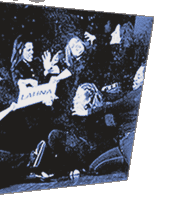
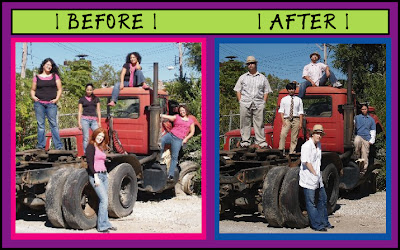
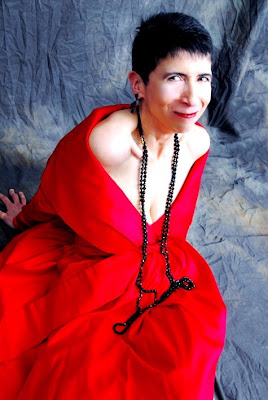

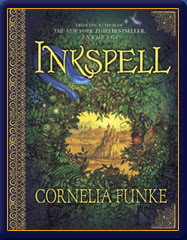
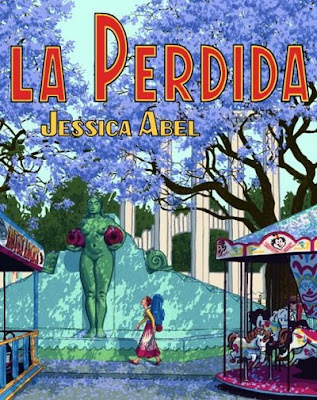
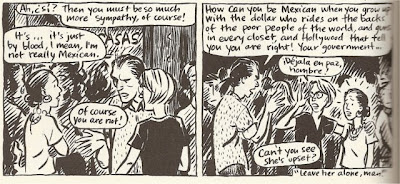
We are lucky to have you in the familia, Lisa. Happy new year and here's to a 2008 filled with literature and love.
Like Dan said, the "lucky" is us.
You've added dimensions, not only geography, to La Bloga--artistic, poetic, thespian, strange, haunting, insightful--as unique as your foto.
Gracias por tus palabras y 'mientos,
RudyG
I have to get out my Xavier Cugat songbook! "oh, the lady in red..." Lisa, thank you for the warm end of year start of year wishes. 2008 will be another great year for you and all of us because we shall make it so.
mvs
Lisa, Lisa, Lisa!
You already know that I love those pictures and the red dress, girl. I am so lucky too to have your insights and friendship. Get ready for a blazing new year.
Great post Lisa,
Happy 2008 to everyone.
saludos,
René
Hi Lisa:
Thank YOU for your generosity and time in helping make PALABRA PURA in Chicago, on more than one front, a fun and meaningful project to be a part of. The Guild Complex looks forward to your continued collaboration in 2008. Thank you for your work on the local curation committee.
Congrats on good friends and a good year!
Excellent way to end the year. Thank you for all you do and all you bring to La Bloga.
Lisa la bella...
My best wishes and love to you in the New Year. Keep fighting that good fight.
Peaces,
Rich.
Kisses to you, sister of my heart. Lean on me anytime!
In love, light, and blessings,
Rose